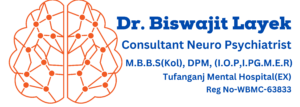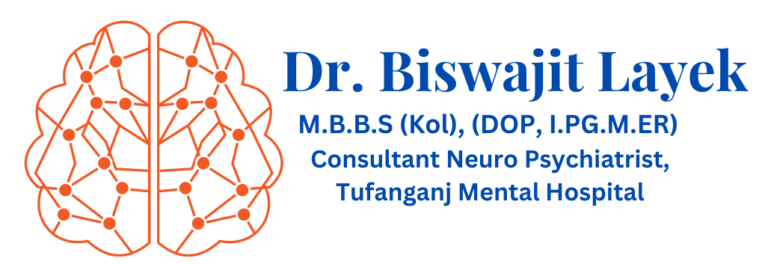Depression ?
Depression is a mental health condition that affects millions of people worldwide. It can be characterized by feelings of sadness, hopelessness, and a loss of interest in activities that were once enjoyed. Depression can also lead to physical symptoms such as fatigue, insomnia, and changes in appetite. While depression can be a challenging condition to manage, there are several effective treatments available. In this blog post, we will discuss some of the most common forms of depression treatment, as recommended by Dr. Biswajit Layek.
1)Psychotherapy:-
Psychotherapy, also known as talk therapy, is a form of treatment that involves talking with a mental health professional. During psychotherapy sessions, a therapist can help the patient identify and address the underlying causes of their depression. There are different types of psychotherapy, including cognitive-behavioral therapy (CBT), interpersonal therapy (IPT), and psychodynamic therapy. CBT is often used to treat depression and involves helping the patient identify negative patterns of thought and behavior and replace them with more positive ones. IPT focuses on the patient’s relationships with others, while psychodynamic therapy aims to identify and address unresolved conflicts from the patient’s past.
2)Medication:-
Antidepressant medications are commonly used to treat depression. These medications work by altering the balance of chemicals in the brain that regulate mood. There are several types of antidepressants, including selective serotonin reuptake inhibitors (SSRIs), serotonin and norepinephrine reuptake inhibitors (SNRIs), and tricyclic antidepressants (TCAs). It’s essential to note that medication should only be taken under the guidance of a mental health professional and should be closely monitored for side effects.
3)Exercise:-
Regular exercise has been shown to be an effective treatment for depression. Exercise can boost the production of endorphins, which are chemicals in the brain that promote feelings of happiness and well-being. Exercise can also improve sleep and reduce feelings of anxiety and stress. Any form of exercise can be beneficial, including walking, running, yoga, or strength training.
4)Mindfulness Meditation:-
Mindfulness meditation involves focusing on the present moment and becoming more aware of one’s thoughts and feelings. This practice can help patients develop a better understanding of their thought patterns and learn how to respond to them in a more positive way. Studies have shown that mindfulness meditation can be an effective treatment for depression.
5)Electroconvulsive Therapy (ECT):-
ECT is a form of treatment that involves passing an electrical current through the brain to produce a seizure. This treatment is typically used for patients who have severe depression and have not responded to other treatments. ECT is considered safe and effective, but it does have some potential side effects, including confusion, memory loss, and headaches.
In conclusion, depression is a complex condition that requires a comprehensive approach to treatment. The above-mentioned treatments, such as psychotherapy, medication, exercise, mindfulness meditation, and ECT, can be effective for managing depression symptoms. It’s essential to work with a mental health professional to determine the best treatment plan for each individual patient.

